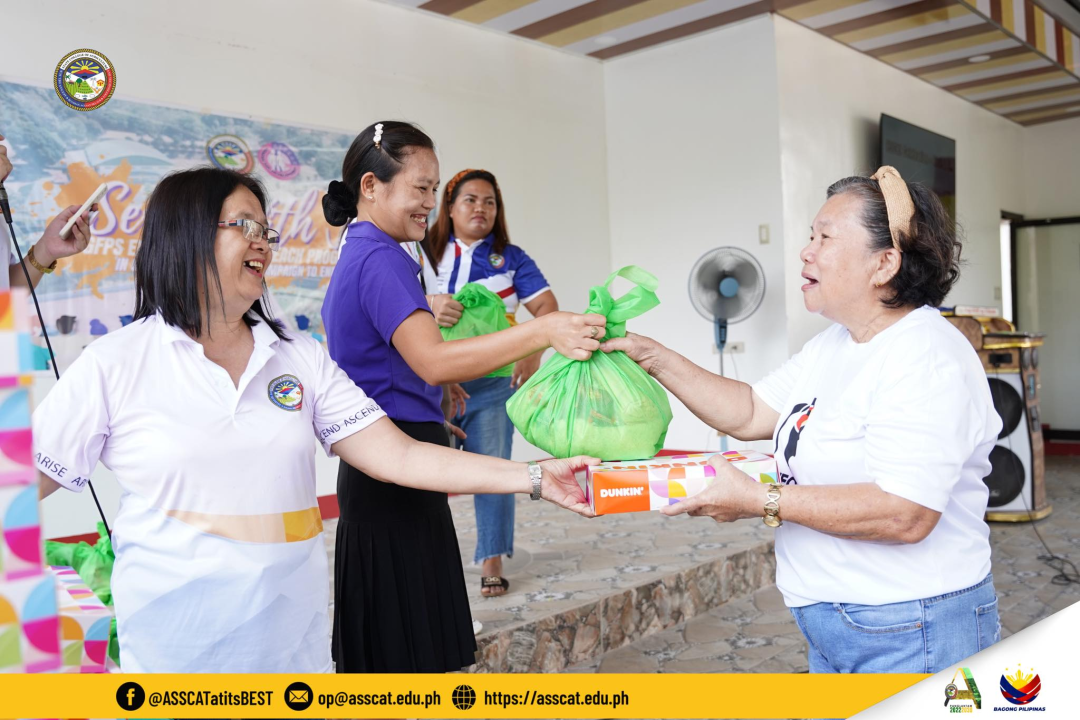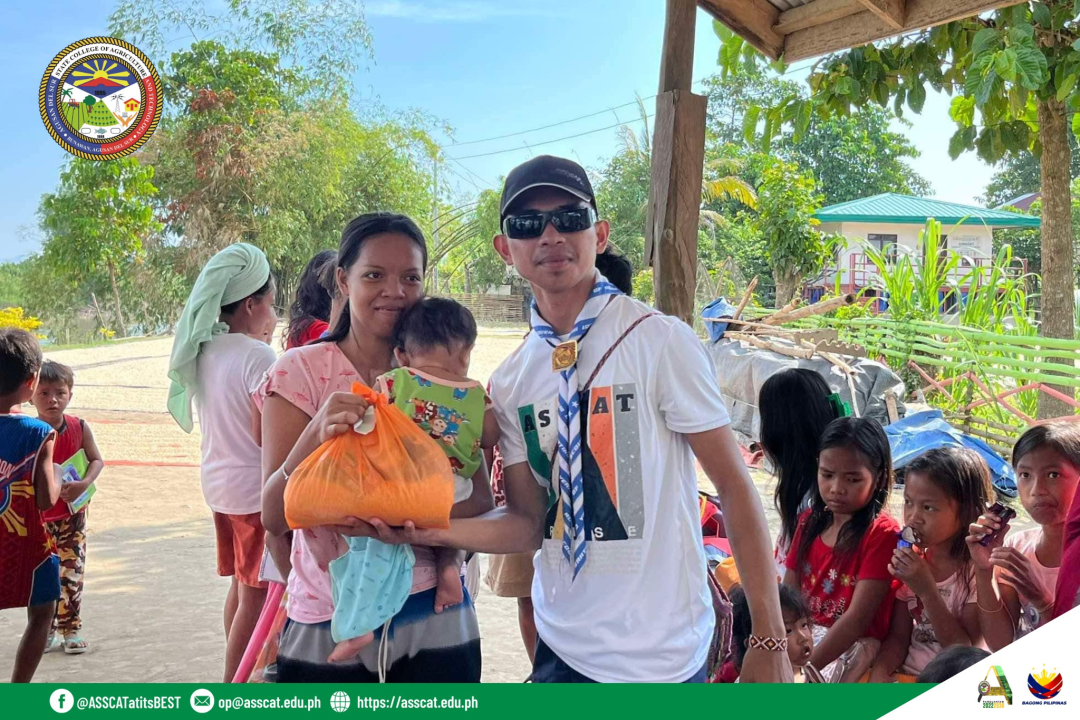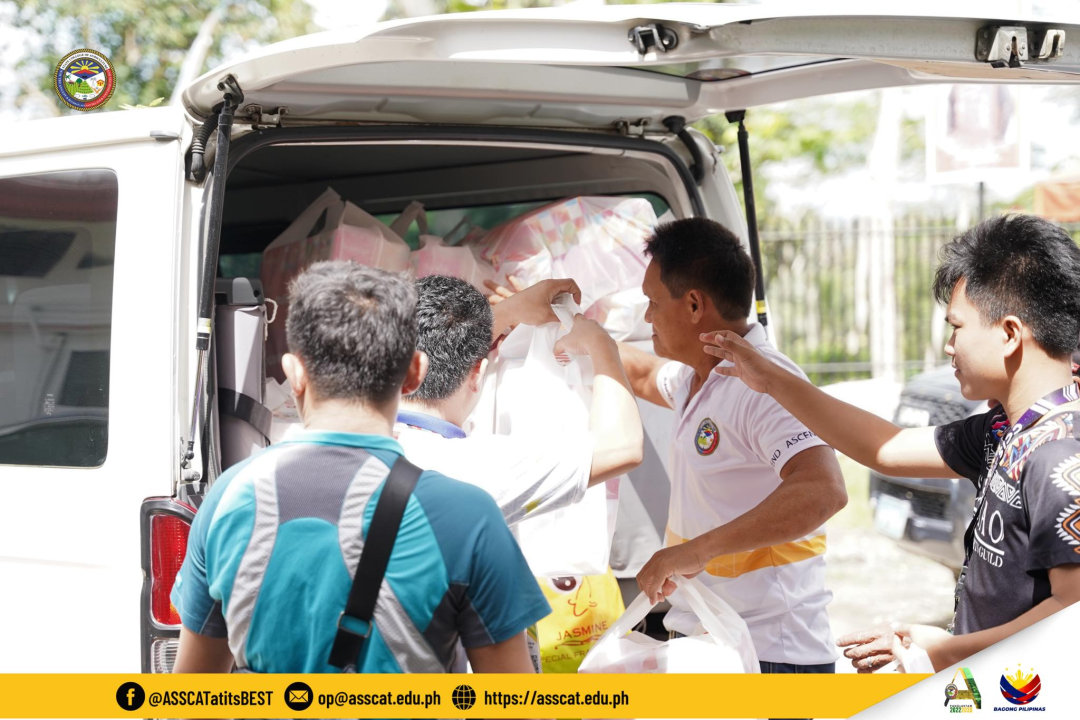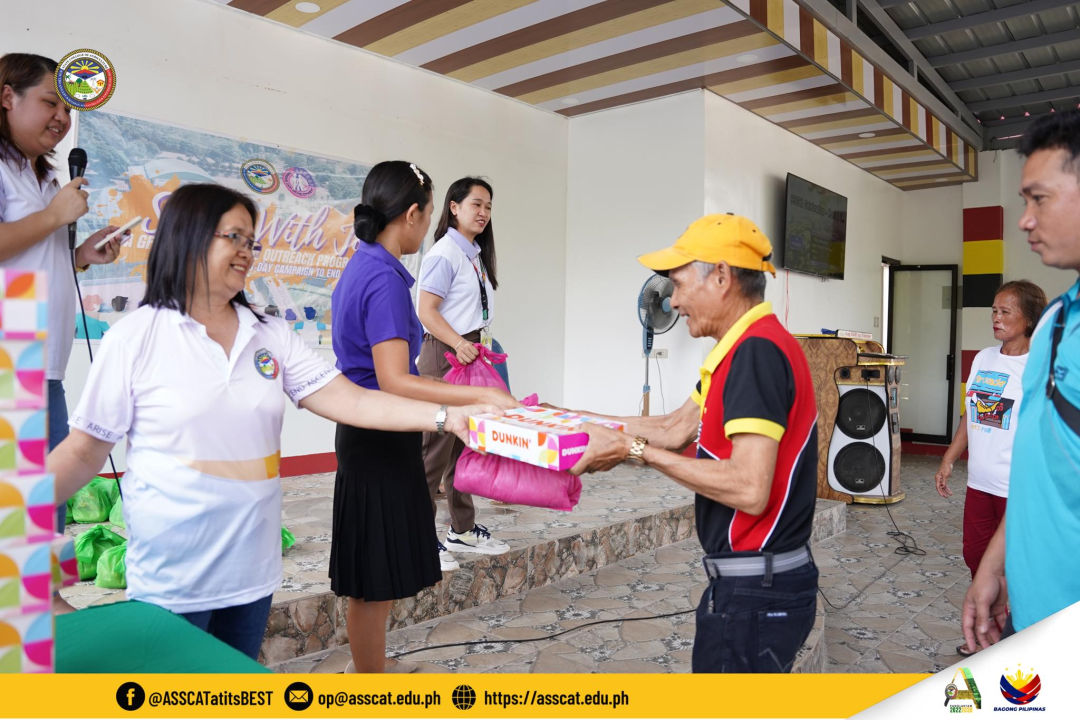SDG 3 Good Health and Well Being
SDG 3 promotes healthy lives and well-being for all, recognizing that strong health systems and informed communities are essential to sustainable development. ASSCAT supports this goal by producing research that addresses mental health, disease detection, and healthcare access—providing evidence and innovation that help improve public health outcomes at the local and global levels.
- Overview
- Indicators and Progress
Agusan del Sur State College of Agriculture and Technology (ASSCAT) advances SDG 3 through research that strengthens mental health understanding, improves disease detection, and informs evidence-based healthcare innovation. The institution’s scholarly outputs demonstrate growing visibility in global platforms—from high-impact engineering journals to biological science publications—showcasing ASSCAT’s expanding contribution to public health knowledge.
By integrating digital technologies, machine learning, biomedical analysis, and community-focused mental health studies, ASSCAT’s research portfolio responds to both local and global health challenges. Its emerging engagement in high-quartile journals and interdisciplinary collaborations highlights the institution’s commitment to making scientific knowledge accessible, citable, and relevant to clinical and public health practice.
3.1 Research on Health & Well-being
ASSCAT’s research under SDG 3 covers mental health, disease diagnostics, natural products, and AI-driven healthcare applications. The institution emphasizes studies that are relevant to public health policy, clinical practice, and community well-being, ensuring that its outputs are both scientifically robust and socially impactful.
3.1.1 Paper Views
The following table highlights ASSCAT’s most viewed research papers under SDG 3, reflecting growing engagement across international platforms.
| Title | Year | Platform / Journal | Total Views | Avg. Views/Month |
|---|---|---|---|---|
| Predictive Model for Assessing Student Mental Health Risk Based on Academic Data Using Machine Learning Algorithm | 2025 | IEEE | 34 | 3 |
| Neuroinflammatory Consequences of COVID-19 Psychological Well-being among Filipino Teachers in Marawi: A Cross-sectional Study | 2024 | African Journal of Biological Sciences | 44 | 4 |
| Serotonin and Dopamine Dysregulation: Unveiling the Toll of COVID-19 on Mental Health among Teachers in Marawi City | 2024 | African Journal of Biological Sciences | 6 | 1 |
| Exploring the Capabilities of Pristine B84 Nanocluster for Selective NO and N₂O Gases Detection Involved to COVID-19: A DFT Analysis | 2024 | Journal of Inorg. & Organomet. Polymers & Materials | 284 | 24 |
| Evaluating Healthcare Benefits of Senior Citizens through Opinion Mining | 2024 | ICIPCN | 50 | 5 |
| Qualitative Phytochemical Analysis and Inhibitory Property of Blue Butterfly Pea Flower Extract against Escherichia coli | 2023 | Int. Journal of Biosciences | 20 | 2 |
The study on Pristine B84 Nanoclusters received the highest attention, with 284 views, reflecting interest in innovative diagnostics. Mental health studies, particularly those analyzing COVID-19’s psychological impact on teachers, also attracted considerable engagement, while AI-driven healthcare assessment and phytochemical studies demonstrate the institution’s breadth in health-related research.
3.1.2 Clinical Citations / Normalized Likelihood
To evaluate the translational potential of ASSCAT’s health research, publications were assessed for likelihood of being cited in clinical guidance using SJR quartile and H-Index as proxies.
| Title / Journal | SJR 2024 | Quartile | H-Index | Normalized Likelihood of Clinical Citation |
|---|---|---|---|---|
| Predictive Model for Student Mental Health Risk – IEEE | 2.502 | Q1 | 346 | 0.60 (High) |
| HPA Axis Dysregulation in Filipino Teachers – African J. Biological Sciences | 0.133 | Q4 | 5 | 0.10 (Low) |
| Neuroinflammatory Consequences of COVID-19 – African J. Biological Sciences | 0.133 | Q4 | 5 | 0.10 (Low) |
| Serotonin & Dopamine Dysregulation – African J. Biological Sciences | 0.133 | Q4 | 5 | 0.10 (Low) |
| Pristine B84 Nanocluster DFT Analysis – J. Inorg. & Organomet. Polymers & Materials | 0.697 | Q2 | 69 | 0.30 (Moderate) |
Interpretation:
Approximately 24% of ASSCAT’s SDG 3 research outputs show moderate-to-high potential for clinical citation. The IEEE-published mental health study has the strongest translational potential, while nanocluster research offers cross-disciplinary biomedical relevance. Q4 mental health studies provide foundational knowledge, though with lower citation likelihood in clinical guidelines.
3.1.3 Publications
Table – Scopus / Indexed Publications
| Title | Author(s) | Journal / Platform | SJR (2024) | Quartile | H-Index | Coverage | Notes |
|---|---|---|---|---|---|---|---|
| Predictive Model for Student Mental Health Risk | Jerald Cabusas et al. | IEEE | 2.502 | Q1 | 346 | 1992–2025 | High visibility, strong translational potential |
| HPA Axis Dysregulation in Teachers | Gil Vincent M. Ebardo | African J. Biological Sciences | 0.133 | Q4 | 5 | 2019–2022 | Local mental health focus, foundational study |
| Neuroinflammatory Consequences of COVID-19 | Gil Vincent M. Ebardo | African J. Biological Sciences | 0.133 | Q4 | 5 | 2019–2022 | COVID-19 mental health impacts |
| Serotonin & Dopamine Dysregulation | Gil Vincent M. Ebardo | African J. Biological Sciences | 0.133 | Q4 | 5 | 2019–2022 | Neurochemical study on mental health |
| Pristine B84 Nanocluster DFT Analysis | Michael M. Sabugaa | J. Inorg. & Organomet. Polymers & Materials | 0.697 | Q2 | 69 | 1996, 2000–2001, 2003–2025 | Diagnostics, translational relevance |
| Blue Butterfly Pea Phytochemical Analysis | – | Int. Journal of Biosciences | – | – | – | – | Antimicrobial research |
ASSCAT’s SDG 3 publications demonstrate breadth and impact across mental health, biomedical innovation, AI healthcare analytics, and natural product research. The portfolio combines high-visibility international publications with locally relevant studies, ensuring both global engagement and community-focused outcomes.
3.2 Health Profession Graduates
3.2.1 Proportion of Graduates in Health Professions
This metric reflects ASSCAT’s contribution to educating future health professionals. It focuses on graduates in health-related fields, such as the Bachelor of Science in Biology (BS Biology) program, which provides foundational knowledge for careers in medicine, public health, allied health sciences, and environmental health.
BS Biology Graduates (2022–2025)
| Academic Year | Total Graduates | BS Biology Graduates | Proportion (%) |
|---|---|---|---|
| 2022–2023 | 1,193 | 59 | 4.9% |
| 2023–2024 | 1,095 | 57 | 5.2% |
| 2024–2025 | 1,273 | 61 | 4.8% |
| Total | 3,561 | 177 | 5.0% |
From Academic Years 2022–2023 to 2024–2025, ASSCAT produced 177 BS Biology graduates out of 3,561 total graduates, representing an average proportion of 5.0%. This steady output demonstrates the College’s commitment to nurturing competent graduates capable of addressing health and environmental challenges.
The BS Biology curriculum combines theoretical instruction with practical training, equipping students with scientific knowledge, research skills, and readiness to contribute to public health, biomedical research, and environmental studies. Graduates are prepared for postgraduate education and professional careers in medicine, public health, allied health sciences, and environmental health.
Through this program, ASSCAT strengthens its role as a regional hub for scientific and health-related education, supporting SDG 3 targets, including the training and retention of a skilled health workforce in developing areas.
3.3 Collaborations & Health Services
3.3.1 Collaborations with Health Institutions
In 2024, the Agusan del Sur State College of Agriculture and Technology (ASSCAT) strengthened formal collaborations with local and provincial health institutions to promote preventive healthcare, enhance student and community wellness, and improve public health outcomes in Agusan del Sur. These partnerships integrate academic learning, applied research, and community service, ensuring access to vital health services for students, employees, and nearby communities.
Key Partnerships
| Partner Institution | Focus / Services | Highlights |
|---|---|---|
| Valentina Galido Plaza Memorial Hospital (VGPMH) | STI, HIV/AIDS, TB prevention and detection | Confirmatory HIV testing, chest X-ray diagnostics, Gen-X TB screening, student internships, shared communicable disease database, training 200+ students annually |
| Municipal Health Unit (MHU) | Schistosomiasis Mass Treatment, Deworming, Vaccination Programs | Biannual preventive programs, health education campaigns, local health data monitoring |
Narrative Summary
ASSCAT’s partnership with VGPMH formalized through a Memorandum of Agreement (MOA) on April 17, 2024, expands access to specialized health services that are unavailable on campus. It also supports student learning through supervised clinical exposure and community health engagement. Together, ASSCAT and VGPMH conduct health education sessions, wellness monitoring, early disease detection, and referral systems, which strengthen disease surveillance and timely treatment.
Collaboration with the Municipal Health Unit (MHU) ensures biannual preventive interventions, including deworming, vaccinations, and mass treatment for schistosomiasis. These activities not only serve students and nearby residents but also provide data for local health monitoring, complementing regional public health efforts.
Provision and Accessibility
These collaborations deliver essential health services both on campus and through outreach activities, ensuring inclusivity and accessibility, especially for remote populations. Students gain hands-on experience in health screening, diagnostics, and research, linking academic training with real-world public health practice.
Evidence and Documentation
Supporting materials include:
- Seminar documentation and policy briefs validating activity implementation and outcomes
3.3.2 Health Outreach Programs
For the Calendar Year 2024, the Agusan del Sur State College of Agriculture and Technology (ASSCAT) actively implemented student-led, community-based outreach programs promoting health and well-being. These initiatives focus on both physical and psychosocial support, particularly during crises affecting local communities.
Key Student-Led Initiatives
| Academic Year | Registered Student Organizations | Activity | Date Conducted |
|---|---|---|---|
| 2024 | KAB-OT (in collaboration with CASO) | Project Ca-agapay: “Solidarity Amidst Adversity” | Jan 30, 2024 |
| 2024 | KAB-OT (collab. with CASO, IPYC, NXA Consuelo, ANPA, ASSCAT Alumni) | Ca-agapay X Pagtambayayong: Immediate Relief Operation | Feb 3, 2024 |
Project Summaries
1. Project Ca-agapay: “Solidarity Amidst Adversity”
Date Conducted: January 30, 2024
Organizations: KAB-OT in collaboration with CASO
This initiative provided immediate relief and emotional support to families and individuals seeking refuge at East Bunawan Elementary School. Volunteers distributed essential food packs and basic necessities while offering psychosocial care through encouraging conversations and acts of kindness. The project emphasized bayanihan, the Filipino spirit of communal unity, highlighting both physical and mental well-being in line with SDG 3, particularly Target 3.4 (promoting mental health and psychosocial well-being).
2. Ca-agapay X Pagtambayayong: Immediate Relief Operation
Date Conducted: February 3, 2024
Organizations: KAB-OT, CASO, IPYC, NXA Consuelo, ANPA, ASSCAT Alumni
This collaborative outreach at Consuelo Elementary School extended humanitarian aid to displaced families affected by crises. The initiative combined the delivery of food, hygiene kits, and essential supplies with emotional support, reflecting the theme of “Pagtambayayong” (unity in working together). Over 200 students participated, gaining practical experience in community health engagement while fostering empathy and solidarity.
3.3.3 Shared Sports Facilities
The Agusan del Sur State College of Agriculture and Technology (ASSCAT) continues to advance community well-being, physical fitness, and inclusive engagement by maintaining open access to its sports and recreational facilities. These include the Track and Field, Covered Court, and Sports and Sociocultural Center, which are regularly used by local residents, youth groups, faith-based organizations, and civic institutions for sports activities, wellness programs, and community-building events. This practice reflects ASSCAT’s mission to promote health, unity, and collaborative partnerships beyond the academic environment.
2024 Access and Use
While 2024 saw limited formal documentation of community sports programs due to post-pandemic adjustments, facility rehabilitation, and internal restructuring, ASSCAT maintained its open-access policy. Local residents continued to use the grounds for:
- Informal fitness routines
- Group training sessions
- Casual community gatherings
This continuity demonstrates the College’s ongoing commitment to community engagement and wellness, even in periods of reduced formal reporting.
Documented Example: 2025 Event
To illustrate the College’s regular facility-sharing tradition, ASSCAT presents a formally documented event from 2025, representative of ongoing practices including 2024:
Event: Friendly Tennis Match during the Pastoral Visit of Bishop Ruben Labajo of the Diocese of Prosperidad
Venue: ASSCAT Covered Court
Participants: Clergy members and ASSCAT College President Dr. Joy Capistrano
Significance:
- Promoted healthy engagement and physical activity
- Strengthened community and faith-based partnerships
- Reinforced ASSCAT’s inclusive and community-oriented approach
3.3.4 Sexual & Reproductive Health Services
The Agusan del Sur State College of Agriculture and Technology (ASSCAT) ensures that students and employees have reliable access to sexual and reproductive health-care services, including information, education, counseling, and preventive resources. These services are provided through the College’s Health and Wellness Unit, in coordination with the Guidance and Counseling Office, Human Resource Management Office (HRMO), and College Clinic, ensuring a holistic, safe, and informed academic environment.
Key Initiatives in 2024
| Activity | Venue | Date/Frequency | Beneficiaries | Description |
|---|---|---|---|---|
| Distribution of Contraceptives (Condoms) | Health & Wellness Unit | 2024 | All ASSCAT Employees and Students | Provides stigma-free access to condoms, promotes responsible sexual behavior, and reduces risk of STIs while linking students to counseling and reproductive health education |
| Sexual & Reproductive Services: Prenatal Care | Health & Wellness Unit | Every 1st Friday of the Month | All Pregnant ASSCAT Employees and Students | Structured prenatal care including medical check-ups, counseling, nutrition guidance, exercise, and stress management to support maternal and fetal well-being |
Program Highlights
- Contraceptive Distribution
- Conducted to promote safe reproductive practices and prevent STIs
- Offered discreet, stigma-free access to supplies
- Supported by multi-sectoral collaboration: Health and Wellness Unit, HRMO, and Guidance Office
- Aligns with SDG 3, Target 3.7: universal access to sexual and reproductive healthcare, family planning, and education
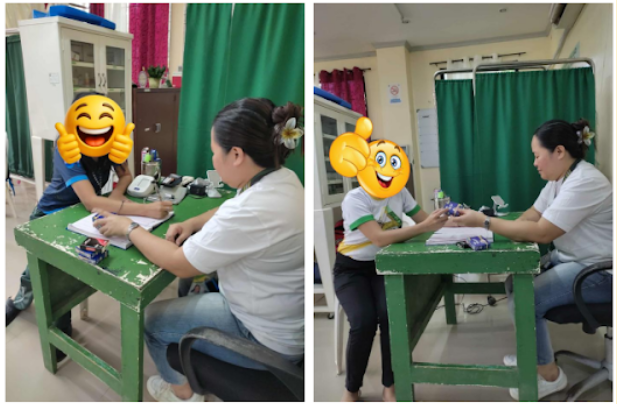
- Prenatal Care Program
- Held every first Friday of the month for pregnant students and employees
- Includes medical check-ups, prenatal counseling, nutrition guidance, prenatal exercise, childbirth preparedness, and stress management
- Supports participants in maintaining academic and professional responsibilities while prioritizing maternal and fetal health
- Reflects ASSCAT’s holistic approach to reproductive well-being, reinforcing SDG 3: Good Health and Well-being

3.3.5 Mental Health Support for Students
The Agusan del Sur State College of Agriculture and Technology (ASSCAT) recognizes that students’ mental health is a fundamental component of their holistic development, academic success, and overall well-being. In 2024, the Guidance and Counseling Office strengthened the College’s psychological support system by implementing targeted mental health education activities and safe spaces for reflection, healing, and dialogue.
These initiatives aimed to raise awareness, equip students with coping strategies, and promote help-seeking behavior, supporting SDG 3: Good Health and Well-being, especially mental health promotion.
Summary of Mental Health Programs (2024)
| Activity Title | Date | Venue | Facilitators | Target Participants |
|---|---|---|---|---|
| Suicide and Depression Awareness Activity | Nov. 27, 2024 | Socio-Cultural Center | Ms. Ma. Elena G. Acebes & Ms. Pinky Azenith A. Abapo | Students, faculty, staff |
| Cultivating Self-Awareness: Better Mental Health | Oct. 23–24, 2024 | GE 101 room-to-room sessions | Guidance Counselors & GE 101 Instructors | GE 101 Students |
1. Suicide and Depression Awareness Activity
Date: November 27, 2024
Venue: ASSCAT Socio-Cultural Center
Facilitators:
- Ms. Ma. Elena G. Acebes, Guidance Counselor
- Ms. Pinky Azenith A. Abapo, Guidance Counselor
As part of PAKIGBISOG 2024, the Guidance and Counseling Office spearheaded a major awareness program focusing on suicide prevention, depression literacy, and mental health advocacy.
Session Highlights
- Ms. Acebes delivered a comprehensive lecture on recognizing signs of depression, root causes, and the importance of empathy and early intervention.
- She emphasized that depression is a health issue, not a personal failure, and requires compassion and professional support.
- Ms. Abapo continued with a session on Mental Health Awareness, underlining the need for help-seeking behaviors and normalized conversations around emotional struggles.
- Interactive sharing allowed students to express concerns, ask questions, and reflect on their emotional experiences.
Impact
- Reduced stigma surrounding mental health issues
- Increased awareness of warning signs and appropriate responses
- Strengthened student confidence in approaching the Guidance Office for help
- Reinforced ASSCAT’s commitment to accessible mental health support
2. Cultivating Self-Awareness: Better Mental Health
Dates: October 23–24, 2024
Venue: Room-to-room (GE 101 classes)
Facilitators: Guidance Counselors & GE 101 Instructors
This two-day program formed part of Mental Health Awareness Month, aiming to strengthen students’ self-awareness as a foundation for emotional resilience.
Program Components
- Self-assessment exercises
- Guided reflection on personal strengths, boundaries, triggers, and emotional habits
- Short lectures on:
- Stress management
- Emotional regulation
- How self-awareness supports academic performance
- Open discussions that allowed students to process their experiences in a supportive environment
Impact
- Students reported increased awareness of personal emotional patterns
- Encouraged early recognition and management of stress
- Strengthened rapport between students and the Guidance Office
- Reinforced that mental health is not only for crises, but is a daily practice
Institutional Commitment and SDG Alignment
ASSCAT’s 2024 mental health initiatives demonstrate a proactive, compassionate, and sustainable approach to student well-being. Through the Guidance and Counseling Office, the College:
- Promotes mental health literacy
- Reduces stigma surrounding psychological issues
- Ensures accessible counseling and referral services
- Supports SDG 3, particularly mental health promotion and well-being
These initiatives affirm ASSCAT’s mission to produce graduates who are emotionally grounded, socially responsible, and holistically developed—recognizing that mental health is a shared responsibility across the entire campus community.
3.3.6 Smoke Free Policy
As of 2024, the Agusan del Sur State College of Agriculture and Technology (ASSCAT) continues to uphold a comprehensive Smoke Free Policy designed to protect the health, safety, and well being of its entire academic community. The policy aligns with national regulations such as the Tobacco Regulation Act of 2003 (Republic Act 9211) and Executive Order 26 series of 2017 which declare the campus a fully smoke free environment.
Policy Implementation
ASSCAT enforces a strict prohibition on the use of:
- Cigarettes
- Electronic cigarettes or vapes
- Heated tobacco products
- Any smoking related device
The ban applies across all indoor and outdoor spaces including classrooms, laboratories, libraries, covered courts, dormitories, walkways and open grounds. This establishes ASSCAT as a completely smoke free campus.
This policy is institutionalized through the Student Handbook, specifically:
Section 130 Table of Misconduct and Penalties
Smoking inside academic or communal spaces is classified as misconduct with escalating sanctions:
- First Offense Warning
- Second Offense Reprimand
- Third Offense Three day suspension
The progressive system reinforces ASSCATs educational rather than punitive approach, emphasizing behavior correction and health awareness.
Section 128.6 Use of Illegal Drugs
This provision, rooted in the Comprehensive Dangerous Drugs Act of 2002 (Republic Act 9165) and CHED Memorandum 18 series of 2018, further strengthens the campus anti smoking environment by addressing substances that may be introduced into the body through smoking.
Together, these sections emphasize the institution’s long standing commitment to a drug free and smoke free learning environment.
Institutional Foundation and Updates
The Smoke Free Policy was first institutionalized in the 53rd Board of Trustees Meeting on December 2, 2005 through Resolution 48 series of 2005 which approved the original Student Handbook.
A comprehensive review was completed during the 122nd Board of Trustees Regular Meeting on December 20, 2021 through Resolution 21 133 series of 2021. This reaffirmed the Smoke Free Policy and mandated editorial refinements to ensure alignment with current health standards and CHED guidelines.
Campus Wide Reinforcement
The policy is jointly implemented by:
• Office of Student Affairs
• Guidance and Counseling Office
• Campus Security Office
Their coordinated efforts include:
• Orientation and information campaigns
• Health education and cessation advocacy
• Campus signage and smoke free reminders
• Enforcement of disciplinary procedures
These initiatives help maintain a safe and healthy environment that supports ASSCATs mission of producing responsible, wellness oriented graduates.
Evidence Summary
| Evidence | Description |
|---|---|
| Board Resolution 48 series of 2005 | Approves the Student Handbook containing Section 130 and Section 128.6 which establish early smoke free provisions. |
| Board Resolution 21 133 series of 2021 | Approves the Revised Student Handbook and reaffirms the Smoke Free Campus Policy. |
| Student Handbook | Contains explicit smoke free rules, penalties and complementary drug free policies. |
| Campus Enforcement Records | Documentation from the Office of Student Affairs, Guidance Office and Security Office showing monitoring and awareness initiatives. |
3.3.7 Mental Health Support for Staff
In 2024, the Agusan del Sur State College of Agriculture and Technology continued its commitment to staff mental wellness by focusing on internal strengthening rather than large scale public activities. The Guidance and Counseling Office and the Human Resource Management Office dedicated the year to evaluating previous programs, building partnerships with mental health organizations, and preparing updated modules for future implementation. These foundational efforts directly supported the rollout of several impactful initiatives in 2025, reinforcing the institution’s alignment with Sustainable Development Goal 3 Good Health and Well Being.
2025 Mental Health Initiatives for Staff
Living Through a Time of Crisis Psychological First Aid Webinar
Date October 16 2025
Platform Google Meet
The webinar titled Living Through a Time of Crisis was conducted in observance of World Mental Health Month and in response to a recent earthquake that affected the region. The session covered increasing mental health concerns, early indicators of depression, and the use of the Emotional Freedom Technique for emotional regulation. Participants were encouraged to engage in open discussion, followed by a question and answer session.
The initiative provided psychological support for both staff and students and helped strengthen emotional resilience across the academic community.
Kumustahan with Job Order Personnel
The Human Resource Management Office and the Guidance and Counseling Office held a meaningful dialogue titled Kumustahan with Job Order Personnel. This activity served as a safe space where job order staff could share thoughts, concerns, and emotional experiences.
The session included discussions on self care, stress management, and emotional resilience. Team building and reflective activities strengthened camaraderie and emphasized the institutional commitment to supporting the mental health needs of all employees regardless of employment classification.
This initiative strongly supports United Nations Sustainable Development Goal 3 particularly Target 3 point 4 which promotes mental health and well being for all.
Training for Human Resource Staff and Supervisors on Mental Health First Response
ASSCAT partnered with the Association of Guidance Counselors in Caraga Incorporated to launch Mental Health Matters through Training on RACE Against Suicide Module 1 Basic Skills for All Personnel. The training was conducted on June 26 at the Quality Assurance Management Function Hall.
Facilitators Ms Maristela C Gales Registered Guidance Counselor and Ms May A Ocarez Registered Guidance Counselor presented sessions on Suicide and the School and on the RACE method which stands for Recognize Assess Convince Entrust. The training equipped staff and supervisors with essential mental health first response skills and strengthened the institution’s capacity to address emotional crises.
College President Dr Joy C Capistrano and senior administrators expressed full support for the initiative. The program contributes to Sustainable Development Goal 3 Good Health and Well Being, Sustainable Development Goal 4 Quality Education, and Sustainable Development Goal 16 Peace Justice and Strong Institutions.
Pre 2024 Evidence of Ongoing Staff Mental Health Support
Creative and Expressive Arts Therapy Workshops and Leadership Development Program
A major institutional initiative titled The Future of Leadership Navigating the Transitional and Transformational Program of ASSCAT was held on December 4 to 5 2023 at the Sports and Socio Cultural Center. The two day activity featured resource speaker Dr Dixon Yasay and focused on the PERMA Theory of Well Being which highlights Positive Emotion Engagement Relationships Meaning and Accomplishment.
Faculty and staff participated in reflective exercises and wellness centered leadership sessions designed to enhance emotional resilience and interpersonal harmony in the workplace. College President Dr Joy C Capistrano and Vice President Ruth S Desamparo reinforced the institution’s commitment to nurturing a flourishing academic community.
This program serves as evidence of ASSCAT’s continuing mental health support for staff through structured wellness sessions and psychologically informed professional development.



